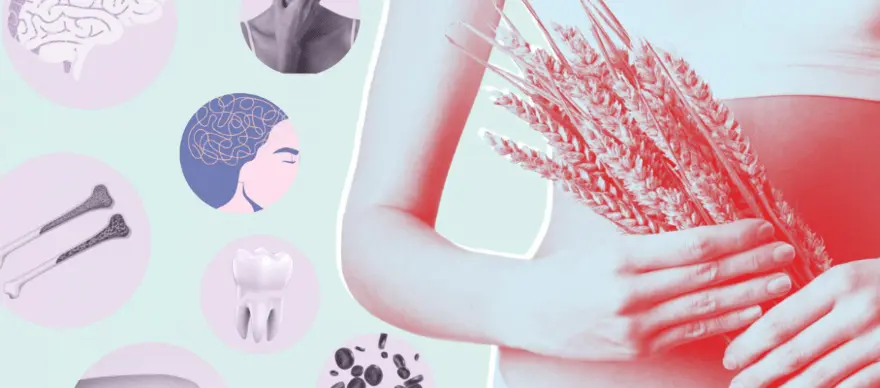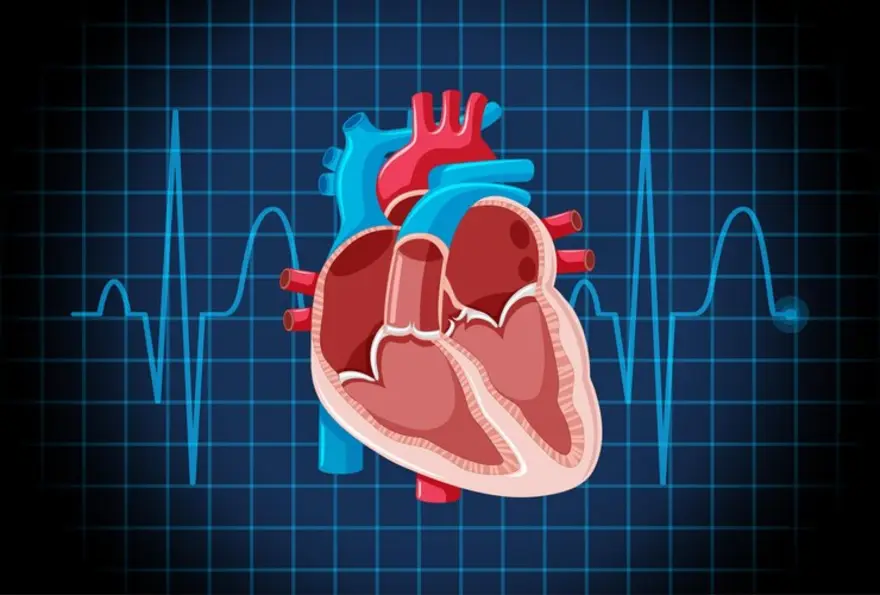Disease
What is Celiac Disease and Its Symptoms and Causes In Adults?
3545 Views
0

Celiac disease is a type of autoimmune disease in which gluten triggers the immune system response and damages the small intestine. One in every 100 people worldwide has celiac disease, and many are ignorant of their illness. According to estimates, up to 2.5 million people in the US may be living with celiac disease undetected.
Symptoms are triggered when you ingest gluten, a type of protein. In order to relieve these symptoms, you can avoid gluten, and change your diet to a gluten-free diet.
Eliminating gluten from one's diet is the only method to avoid experiencing its symptoms. The procedure of diagnosis, risk factors, and gluten-free diets are covered in further detail below, along with the symptoms of celiac disease. Celiac disease mainly harms the small intestine. There are two types of gluten sensitivity -
- Celiac disease: There are specific markers in the blood that help determine the diagnosis.
- Non-celiac disease: There are no specific markers; thus, the diagnosis requires symptoms.
Symptoms of Celiac Disease
The symptoms of celiac disease range from minor to severe. They may vary from person to person and evolve. Some individuals never exhibit symptoms or only do so later in life. It's possible that unless one develops anaemia or a nutritional shortage, they are unaware that they have celiac disease.
- Diarrhea
- Bloating
- Gas
- Abdominal pain
- Nausea and vomiting
- Constipation
- Fatigue
- Weight loss
However, adults with celiac disease have signs and symptoms that are not related to the digestive system, including:
- Anemia, mostly due to iron deficiency
- Itchiness
- Dermatitis herpetiformis
- Ulcers in mouth
- Headaches
- Fatigue
- Numbness and tingling in the feet and hands, cognitive impairment, and problems with balance.
- Joint pain
- Loss of bone density (osteoporosis) or bone softening (osteomalacia)
- The functioning of the spleen is reduced
Children having celiac disease have more digestive problems compared to adults, which include:
- Nausea
- Vomiting
- Constipation
- Gas
- Swollen belly
- Foul-smelling stools
- Chronic diarrhea
One of the conditions in people with celiac disease is nutrient deficiency because the damage to the intestine will slowly restrict the absorption of nutrients leading to vitamin deficiency. Because of the same reason, a person may appear anemic due to iron deficiency.
Causes of Celiac Disease
The purpose of our immune system is to protect us from foreign invaders. If you have celiac disease, and you eat food containing gluten, your immune system attacks the lining of your gut. This causes inflammation in the intestines and damages the villi. The villi are the hair-like structures on the lining of the small intestine that help in the absorption of nutrients. When the villi get damaged, they cannot absorb nutrients, and no matter how much you eat, ultimately you will develop malnutrition.
Risk factors of Celiac Disease
The disease is common in Caucasians and people who have other diseases, including:
- A family history of celiac disease
- Type 1 diabetes
- Down syndrome
- Autoimmune thyroid disease
- Microscopic colitis
- Addison’s disease
- Rheumatoid arthritis
- Multiple Sclerosis
- Autoimmune hepatitis
- Turner syndrome
Celiac Disease Complications
It can be dangerous if you leave it untreated. Complications may include:
- Cancer, such as intestinal lymphoma and small bowel cancer
- Damaged tooth enamel
- Miscarriage and Infertility
- Malnutrition
- Lactose intolerance
- Neurological problems like seizure
- Pain and numbness in your hands and feet
- Pancreatic disease
- Weak bones
Diagnosis of Celiac Disease
Many people with celiac disease are not aware of their disease conditions. In order to diagnose, you have to get blood tests or endoscopy done. Serological tests can be used as a screening test to select patients for endoscopy and biopsy.
Serology testing is done to determine the levels of antibodies in your blood. High levels of certain antibody proteins signify there is an immune reaction to gluten. It is crucial to perform the tests before having a gluten-free diet. If you remove gluten from your diet, the blood tests will apparently show normal results. Tests include antibodies against tTG, gliadin and endomysium.
Your healthcare provider may recommend a few other tests to check for any nutritional deficiency, such as an iron deficiency test. Genetic testing is performed like HLA (human leukocyte antigens) testing (HLA-DQ2 and HLA-DQ8) that can be done to rule out celiac disease.
If your results indicate that you have celiac disease, your doctor will mostly refer a few more tests like:
Endoscopy. A long tube with a tiny camera is inserted into your mouth and passed down to your throat. The camera will allow the doctor to see your small intestine and will help to take a biopsy (small tissue) to view the damages of the villi.
Celiac Disease Diet
The symptoms of celiac disease are significantly reduced when one switches to a gluten-free diet. A person can see relief within a few days or weeks. In newborns, the small intestine heals typically in three to six months. Complete recovery might take several years for adults.
Following a gluten-free diet has become simpler over time as gluten-free options are easily available. The body can effectively absorb nutrients from meals as the digestive system recovers.
Foods to Avoid:
- Wheat, rye, and barley all naturally contain the protein gluten.
- Most grains, pasta, cereals, and processed meals all contain gluten.
- Gluten may also be present in alcoholic beverages manufactured from grains.
Foods That Don't Contain Gluten:
- Meat and seafood
- Vegetables and fruits
- Grains such as buckwheat, amaranth, and rice.
- Pasta and cereals made from rice, corn, millet, sorghum, and Teff.
Treatment of Celiac Disease
Patients should avoid any food that has gluten in it, including wheat, barley, or rye. Your doctor will recommend you visit a dietician for a formal diet plan. Eliminating gluten from your diet will gradually decrease the inflammation of your gut, you will experience a change you will feel better and eventually heal.
However, the complete healing of villi will take months to years. It often takes too long to heal in adults, like two to three years compared to six months in children.
You will need regular follow-up and have to remain on this diet for the rest of your life. Even consuming a little quantity of gluten can have an adverse effect on your intestine and your symptoms will return.
Even with celiac disease, you can still eat a healthy well-balanced diet. For example, bread and pasta are available made out of other types of flour (corn, soy, and rice).
Gluten-free fresh fruits, vegetables, fish, and meats are also available in the market, you can consume them since it’s not been artificially processed.
Medication like diamino diphenyl sulfone (Dapsone) helps relieve the symptoms of Dermatitis herpetiformis. Vitamin and mineral supplements can help people with celiac disease prevent or address deficits.
Treatments that might lessen the pain of those with celiac disease and improve long-term recovery chances are still being investigated by researchers. The Celiac Disease Foundation provides further information on potential future therapies.
How can I prevent Celiac Disease?
Celiac disease cannot be cured. However, early detection and management of celiac disease like following a gluten-free diet may prevent the severity of the disease. Therefore, it is very crucial to get yourself checked if you are experiencing any symptoms of celiac disease. Especially if you have a high risk of having the condition.
Conclusion
Celiac disease is an autoimmune disorder that can cause numerous symptoms including, digestive difficulties, nervous system problems, weight loss, nutritional deficiencies, and fatigue. However, symptoms of celiac disease vary from person to person .
If you have celiac disease, a gluten-free diet is vital for your health. A gluten-free diet will be a big change and challenge in your life. You have to follow gluten-free eating habits strictly that will help you to manage your condition, and eventually, it will reduce your symptoms.
Speak to your doctor, if you are doubtful about having celiac disease and get yourself tested.
 Home Visit
Home Visit Upload
Upload














1701259759.webp)









 WhatsApp
WhatsApp